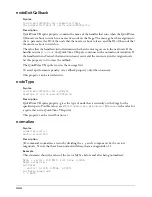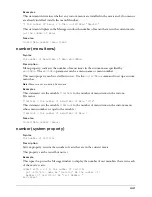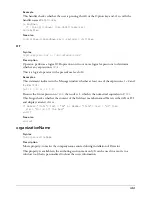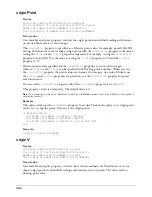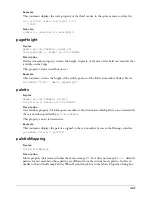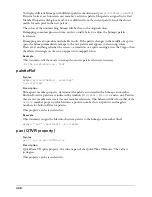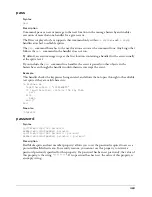
448
on
Syntax
on
handlerName
{
argument1
}, {
arg2
}, {
arg3
} ...
statement(s)
end
handlerName
Description
Keyword; indicates the beginning of a handler, a collection of Lingo statements that you can
execute using the handler name. A handler can accept arguments as input values and returns a
value as a function result.
Handlers can be defined in behaviors, movie scripts, and cast member scripts. A handler in a cast
member script can be called only by other handlers in the same script. A handler in a movie script
can be called from anywhere.
You can use the same handler in more than one movie by putting the handler’s script in a
shared cast.
open
Syntax
open {
whichDocument
with}
whichApplication
Description
Command; launches the application specified by the string
whichApplication
. Use
whichDocument
to specify a document that the application opens when it is launched. When either
is in a different folder than the current movie, you must specify the full pathname to the file or files.
The computer must have enough memory to run both Director and other applications at the
same time.
This is a very simple command for opening an application or a document within an application.
For more control, look at options available in third-party Xtra extensions.
Examples
This statement checks whether the computer is a Macintosh and then if it is, opens the
application TextEdit:
if the platform contains "Mac" then open "TextEdit"
This statement opens the TextEdit application, which is in the folder Applications on the drive
HD, and the document named Storyboards:
open "Storyboards" with "HD:Applications:TextEdit"
See also
openXlib
openResFile
This is obsolete. Use
recordFont
.
Summary of Contents for DIRECTOR MX-LINGO DICTIONARY
Page 1: ...Lingo Dictionary Macromedia Director MX...
Page 756: ...Index 756...

